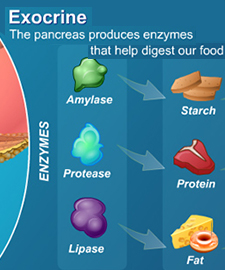If you have celiac disease/gluten-sensitivity, following a gluten-free diet prevents damage to your pancreas.
Are you still experience abdominal pain, gas, or diarrhea on a strict gluten-free diet? Then, you may want to get evaluated for EPI (exocrine pancreatic insufficiency).
The pancreas is an organ in the digestive system that functions as both an endocrine gland (secreting its products/hormones directly into the blood) and an exocrine gland (secreting its products through tube-like ducts). The exocrine pancreas secretes the enzymes( lipase, protease, and amylase) needed for food digestion in the duodenum (first part of the small intestine), and bicarbonate to neutralize stomach acid.
The pancreas can become ineffective due to decreased production, stimulation, or delivery of its products. Pancreatic diseases and conditions that can cause pancreatic damage severe enough to lead to insufficiency include:
- Celiac Disease/non-Celiac gluten intolerance
- Gastrointestinal surgery in which parts of the pancreas or stomach are removed;
- Crohn’s Disease, an inflammatory bowel disease that affects the lining of the digestive tract, causing the inability to absorb nutrients, and the pancreas to compensate;
- Diabetes
- Inflammation of the pancreas (chronic pancreatitis), which can result from chronic alcohol abuse or pancreatic disease;
- Cystic Fibrosis, a genetic disease that commonly begins in childhood, which can lead to exocrine pancreatic insufficiency by blocking the pancreas from secreting digestive enzymes;
- Autoimmune diseases, such as lupus.
There are a myriad of over-the-counter enzyme supplements. However, the best path to healing is through the capable hands of your family doctor!
Good luck! Please, drop me a line to tell me how it works for you.


